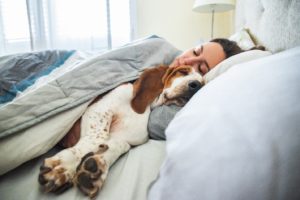
More than one-third of the homes in the U.S. have a dog, while about one-fourth have a cat, according to a survey by the American Veterinary Medical Association. Indeed, our culture places a high value on our furry friends. Some people even spoil their pets by allowing them into their bedroom — many even share a bed with their dog or cat. If that’s true of you, you might wonder how this arrangement is affecting the quality of your sleep. Do pets and sleep apnea have a positive or negative relationship? Let’s talk about these important topics.
Possible Advantages of Sleeping with a Pet
A study by the Mayo Clinic set out to learn how dogs affect sleep. The human participants all had good health and were free of sleep disorders. The people slept best when they shared a bed with a human partner. However, they also had a medium-sized dog in the room, but the dog was not allowed on the bed with them.
Other research has uncovered that many people experience feelings of security and warmth when they sleep with a pet. Such feelings may, in turn, promote better rest. This might be especially true for young children and adults who do not share a bed with a human partner.
Disadvantages of Sleeping with a Pet
The previously mentioned study from the Mayo Clinic found that having a dog on the bed can interfere with sleep efficiency (a ratio that compares time spent in bed with time asleep). However, the effect was not severe for most people.
If you have sleep apnea, there might be additional disadvantages to sleeping with your furry friend. Obstructive sleep apnea is closely related to the structure of your airway. If you have any allergies to pet dander, having your cat or dog in your bedroom at night could cause nasal congestion, mouth breathing, and irritation in your respiratory tract. As a result, your sleep apnea symptoms may worsen.
Minimizing Your Pet’s Impact on Your Sleep
Whether you sleep with your pet is a personal choice — but it would be wise to take a few steps to minimize the impact they have on the quality of your rest. Here are a few tips to help you:
- Create a cozy place for your pet to sleep that is in your bedroom but not with you on your bed.
- Have a thorough cleaning routine for your bedroom. Regularly vacuuming the carpet, washing all your bed linens, and washing your pet’s bed are all important. Regularly bathing your dog is also a good idea.
- If you have allergies, ask your doctor if they can prescribe a medication to lessen your pet’s impact on your ability to breathe.
- Keep up with your sleep apnea treatment, whether it is an oral appliance or a CPAP machine. If you have a CPAP, you may need to take extra precautions to make sure that your pet does not chew on the wires or get tangled up in them.
Pets are wonderful — but they aren’t always good for sleep. Fortunately, a few simple adjustments may help both you and your furry friend enjoy restful, rejuvenating nights.
Meet the Practice
Dr. Mitch Conditt is a general dentist who focuses primarily on helping patients find relief from sleep apnea and TMJ disorder. He is proud to provide oral appliance therapy to residents of Fort Worth and the surrounding communities. To learn more about Dr. Conditt and his services, contact our office at 817-527-8500.
